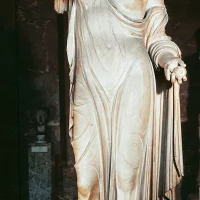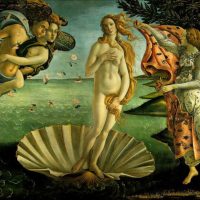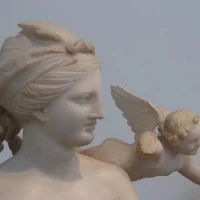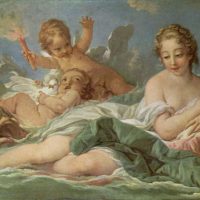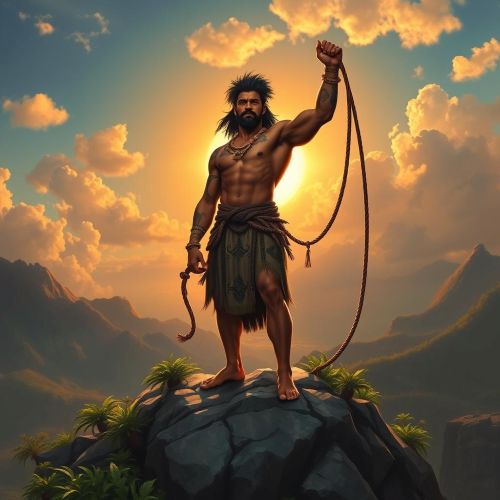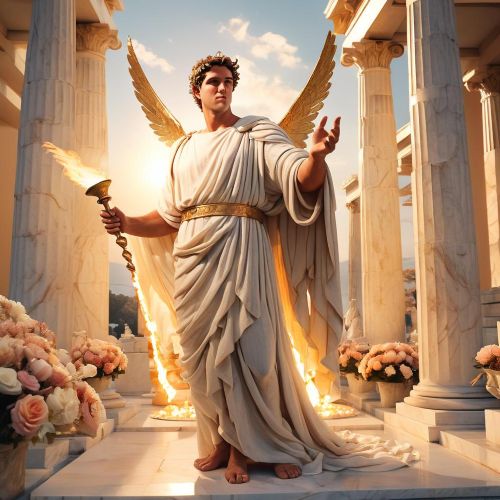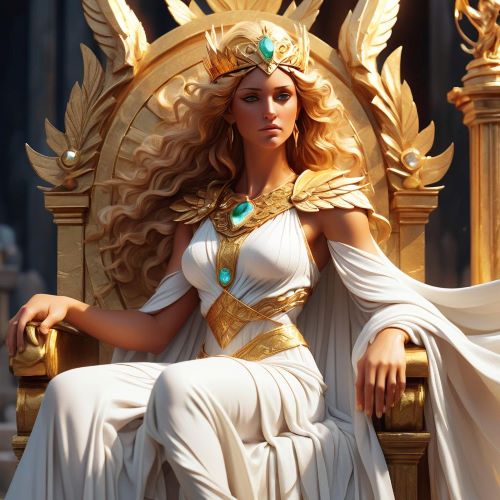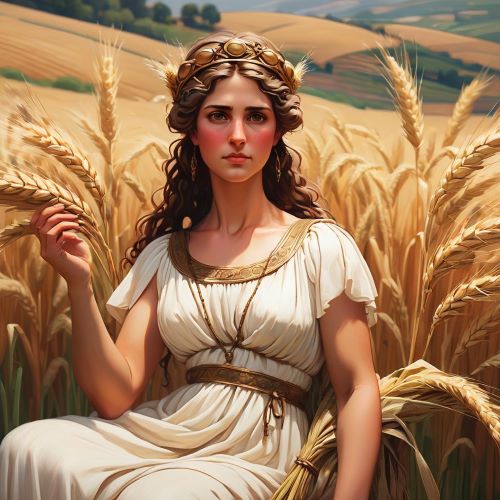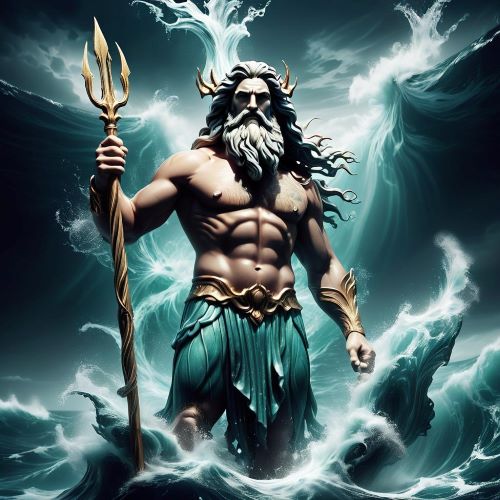Aphrodite : Goddess of Love
Listen
At a glance
| Description | |
|---|---|
| Origin | Greek Mythology |
| Classification | Gods |
| Family Members | Uranus (Father), Hephaestus (Husband) |
| Region | Greece |
| Associated With | Beauty, Love |
Aphrodite
Introduction
Aphrodite, revered as the quintessence of love, desire, and beauty among the ancient Greek deities, remains a timeless symbol whose influence transcends epochs. Born from the foam of the sea, her divine origins speak of an ethereal essence that enchants all who encounter her. Throughout myth and legend, Aphrodite’s radiant presence ignites passions and influences destinies, captivating both ancient and modern audiences alike. Her enduring legacy persists as a testament to the profound impact of her enchanting persona, which continues to inspire countless artistic expressions and cultural interpretations.
Physical Traits
Aphrodite’s beauty transcended mortal comprehension, a vision of divine grace and allure emerging from the sea’s frothy embrace. Her flowing golden locks framed features of ethereal perfection, with eyes akin to shimmering sapphires reflecting the heavens above. Adorned in garments that accentuated her celestial elegance, artists sought to capture her timeless charm in marble and paint, immortalizing her essence for generations to come. Among these depictions, the iconic Venus de Milo statue remains a symbol of Aphrodite’s eternal enchantment, despite its missing limbs.
Poets, enraptured by her unparalleled loveliness, penned verses describing her flawless complexion reminiscent of polished ivory, her smile capable of melting even the sturdiest resolve, and her voice akin to the sweetest of melodies. Yet, perhaps no portrayal rivals the image of Aphrodite rising from the sea, her form sculpted to perfection, radiating an otherworldly grace that captivates all who behold it.
Throughout ancient artworks and literature, Aphrodite’s luminous presence embodies the epitome of feminine allure and charm, captivating hearts with a radiance capable of enchanting even the most stoic souls. Whether depicted draped in opulent attire or in a state of divine nudity, her physical form serves as a testament to the embodiment of desire and passion, immortalizing her as the quintessence of beauty in its purest form.
Family
Aphrodite’s origin story is as enigmatic as her persona, intertwined with the tumultuous affairs of the Greek pantheon. According to the prevailing myth, she emerged fully formed from the sea foam near Cyprus, a consequence of Cronus’s castration of Uranus, which led to the latter’s severed genitals being cast into the sea. This peculiar birth narrative imbues Aphrodite with an aura of primordial chaos, setting her apart from her fellow Olympian deities.
Her familial connections weave a complex tapestry of divine relationships. While often portrayed as the wife of Hephaestus, the skilled craftsman god, her affections frequently wander to other gods and mortals, notably Ares, the god of war. These tumultuous relationships epitomize Aphrodite’s intricate nature, embodying both the purity of love and the turbulence of desire.
Alternatively, Hesiod’s Theogony presents Aphrodite’s genesis as arising from the foam created by Uranus’s severed genitals, thrown into the sea by Cronus. This origin story underscores her close association with the sea, aligning her with maritime adventures and seafaring pursuits. In some accounts, she is depicted as the daughter of Zeus and Dione, adding further layers to her familial lineage.
Homer’s rendition offers yet another perspective, portraying Aphrodite as the daughter of Zeus and Dione, a lesser goddess. Regardless of her lineage, Aphrodite’s matrimonial bonds were fraught with complexity. Married to Hephaestus in an arrangement likely orchestrated by Zeus, their union lacked the passion Aphrodite sought, leading her into numerous affairs, notably with Ares. Their liaison bore fruit in the form of Eros, the winged god of love, and the formidable twins Phobos and Deimos, underscoring the scandalous intrigues that characterized Olympian life.
Other names
Aphrodite’s influence radiated far beyond the borders of Greece, earning her epithets that transcended geographical boundaries. Known as “Pandemos” (goddess of all people) and “Urania” (heavenly), she embodied aspects of love and desire that resonated with diverse cultures. Her worship, originating in the East, bore echoes of ancient Middle Eastern goddesses like Ishtar and Astarte, enriching her mythos with a tapestry of cultural influences.
Homer’s designation of her as “Cyprian” further rooted Aphrodite’s identity in the island of Cyprus, where her cult flourished. Throughout history, she garnered various titles reflecting her multifaceted nature. From “Aphrodite Urania,” the celestial goddess of spiritual love, to “Aphrodite Pandemos,” the goddess of earthly love and desire, each epithet revealed a different facet of her divine essence.
Beyond her well-known roles, Aphrodite was hailed by diverse titles such as “Cytherea,” derived from the island of Cythera, a hub of her worship. Sailors honored her as “Pelagia,” acknowledging her connection to the sea, while in Sparta, she was revered as “Areia,” embodying a more martial aspect associated with war and victory. Each epithet, from “Pandemos” to “Urania,” encapsulated distinct manifestations of love, be it earthly or celestial, highlighting the complexity of Aphrodite’s dominion.
In Roman mythology, Aphrodite found equivalence in Venus, the goddess of love and beauty, reaffirming her enduring influence across cultures and epochs. This assimilation underscored the universality of Aphrodite’s character, transcending temporal and geographical barriers to permeate the collective consciousness of humanity.
Powers and Abilities
Aphrodite’s dominion extended far beyond mere mortal comprehension, as she possessed a formidable array of powers capable of influencing both gods and mortals. Foremost among her abilities was the enchanting power to inspire love and desire, wielded through her magical girdle, the Cestus, whose mere sight could captivate any beholder. Accompanied by her retinue of winged companions, the Erotes, she orchestrated affairs of the heart with golden arrows, igniting flames of passion in unsuspecting souls.
Yet Aphrodite’s influence transcended mere physical attraction; she held sway over beauty itself, shaping perceptions of herself and those around her. However, her powers were not omnipotent; she could not dictate the course of love or compel affections, often leading to unforeseen and sometimes calamitous consequences, as depicted in countless myths.
Beyond romantic love, Aphrodite presided over domains of fertility, pleasure, and joy. While her public worship rituals bore solemnity, she also held patronage over prostitutes, reflecting the multifaceted nature of her influence. Her myriad dalliances with both gods and mortals fueled tales of passion and intrigue, with notable lovers including the Trojan shepherd Anchises, father of Aeneas, and the ill-fated Adonis.
Modern Day Influence
Aphrodite’s enduring legacy reverberates through the annals of history and permeates modern culture. Her iconic depiction in Sandro Botticelli’s “The Birth of Venus” immortalizes her emergence from the sea, symbolizing beauty and desire for generations to come. The resonance of her name echoes in the concept of “aphrodisiacs,” substances believed to ignite passion and desire, underscoring her enduring influence on human perception.
In literature, music, and popular culture, Aphrodite’s timeless essence continues to captivate audiences, serving as a poignant reminder of love’s enduring power. From Renaissance paintings to contemporary films and television shows, her allure transcends epochs, evoking fascination with themes of beauty, desire, and feminine strength.
Moreover, Aphrodite’s legacy extends beyond mere artistic representation, manifesting in societal concepts and cultural practices. The notion of aphrodisiacs, while debatable in efficacy, maintains a symbolic link to Aphrodite’s realm, highlighting humanity’s enduring fascination with love and desire.
Her influence on Western art spans centuries, inspiring countless sculptures, paintings, and literary works. William Shakespeare’s renowned plays, including “Romeo and Juliet” and “A Midsummer Night’s Dream,” delve into themes of love and desire heavily influenced by Greek mythology surrounding Aphrodite. Additionally, her Roman counterpart, Venus, became a central figure in Renaissance art and philosophy, further solidifying Aphrodite’s timeless relevance in shaping human understanding of love and beauty.
Related Images
Frequently Asked Questions
What is lorem Ipsum?
I am text block. Click edit button to change this text. Lorem ipsum dolor sit amet, consectetur adipiscing elit. Ut elit tellus, luctus nec ullamcorper mattis, pulvinar dapibus leo.
What is lorem Ipsum?
I am text block. Click edit button to change this text. Lorem ipsum dolor sit amet, consectetur adipiscing elit. Ut elit tellus, luctus nec ullamcorper mattis, pulvinar dapibus leo.
What is lorem Ipsum?
I am text block. Click edit button to change this text. Lorem ipsum dolor sit amet, consectetur adipiscing elit. Ut elit tellus, luctus nec ullamcorper mattis, pulvinar dapibus leo.
What is lorem Ipsum?
I am text block. Click edit button to change this text. Lorem ipsum dolor sit amet, consectetur adipiscing elit. Ut elit tellus, luctus nec ullamcorper mattis, pulvinar dapibus leo.
What is lorem Ipsum?
I am text block. Click edit button to change this text. Lorem ipsum dolor sit amet, consectetur adipiscing elit. Ut elit tellus, luctus nec ullamcorper mattis, pulvinar dapibus leo.


